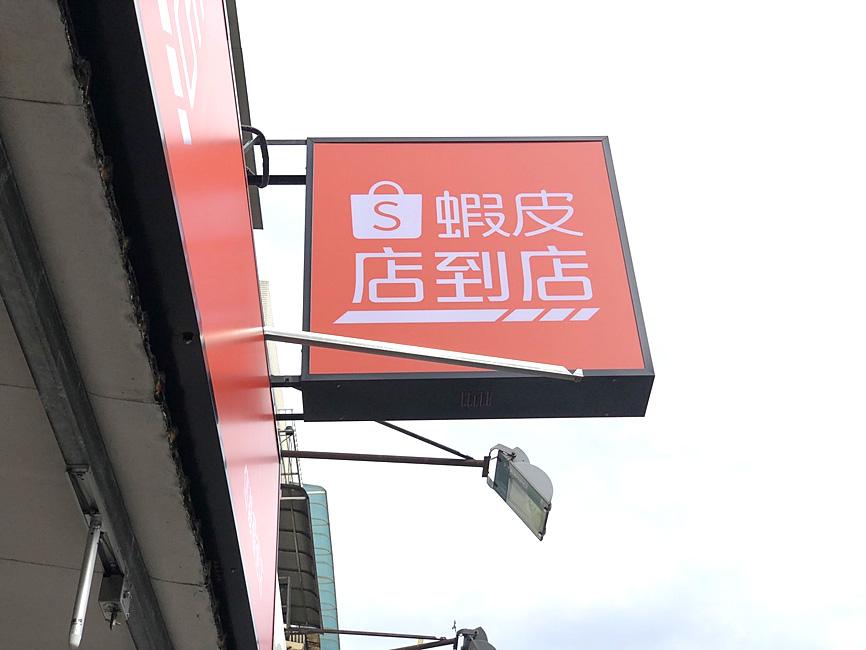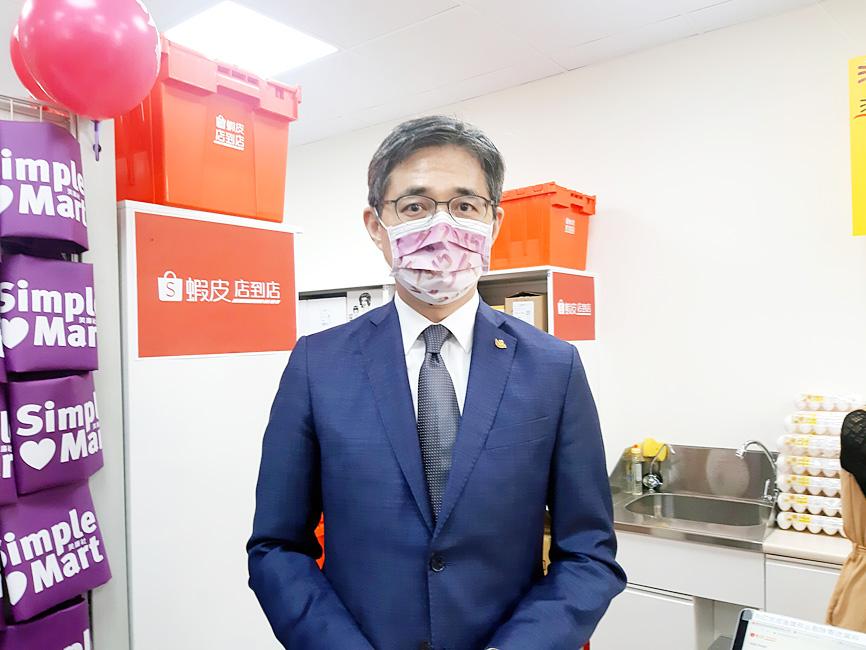E-commerce operator Shopee has opened brick-and-mortar stores in Taiwan in an attempt to increase business and add customers unfazed by the COVID-19 pandemic, which has dampened business at physical retailers for the past two years, Sinyi Realty Inc (信義房屋) said yesterday.
The number of Shopee stores has spiked from 20 in August to 150 this month as the firm seeks to cut dependence on convenience stores for pickup services and boost its own sales as people pick up packages.
The tally suggests that Shopee has opened a new store each day in the past three months, Sinyi head researcher Tseng Ching-der (曾敬德) said.

Photo courtesy of Sinyi Realty Inc
The company on its Web site indicated that it would add more outlets to improve its services across Taiwan, Tseng said.
More than 85 percent of online shoppers in Taiwan pick up the goods at convenience stores, with more than 300 million items delivered to 7-Eleven and FamilyMart stores alone, Tseng said, citing Institute of Information Industry data.
The volume suggests huge business potential for Shopee and merits the establishment of its own retail outlets, he said.

Photo: CNA
Shopee’s stores are all in Taipei, New Taipei City and Taoyuan and have floor space of 10 to 50 ping (33.1m2 to 165.3m2), he said.
It is seeking deals with landlords in Keelung, Hsinchu, Miaoli, Taichung and Changhua and would soon establish locations across Taiwan, Tseng said.
Shopee is interested in relatively affordable locations that do not have to be on main streets with heavy flows of people, as people will choose locations that are convenient for them, he said.
Shopee is collaborating with supermarket chain Simple Mart (美廉社) in some locations.
Simple Mart, operated by Simple Mart Retail Co (三商家購), said it is to set aside 2 to 3 ping at its supermarkets for Shopee’s goods.
The partnership is expected to increase customers by 20 percent and boost revenue, Simple Mart general manager Chiu Kuang-lung (邱光隆) said.
Shopee proposed the cooperation in the first half of this year and Simple Mart agreed in September, prompted by a surge in online shopping amid a COVID-19 alert, Chiu said.
Simple Mart shared a desire to tap into the digital economy and the collaboration would help it advance the shift in business strategy, he said, adding that the firms would deepen the collaboration if necessary.

CHIP RACE: Three years of overbroad export controls drove foreign competitors to pursue their own AI chips, and ‘cost US taxpayers billions of dollars,’ Nvidia said China has figured out the US strategy for allowing it to buy Nvidia Corp’s H200s and is rejecting the artificial intelligence (AI) chip in favor of domestically developed semiconductors, White House AI adviser David Sacks said, citing news reports. US President Donald Trump on Monday said that he would allow shipments of Nvidia’s H200 chips to China, part of an administration effort backed by Sacks to challenge Chinese tech champions such as Huawei Technologies Co (華為) by bringing US competition to their home market. On Friday, Sacks signaled that he was uncertain about whether that approach would work. “They’re rejecting our chips,” Sacks

It is challenging to build infrastructure in much of Europe. Constrained budgets and polarized politics tend to undermine long-term projects, forcing officials to react to emergencies rather than plan for the future. Not in Austria. Today, the country is to officially open its Koralmbahn tunnel, the 5.9 billion euro (US$6.9 billion) centerpiece of a groundbreaking new railway that will eventually run from Poland’s Baltic coast to the Adriatic Sea, transforming travel within Austria and positioning the Alpine nation at the forefront of logistics in Europe. “It is Austria’s biggest socio-economic experiment in over a century,” said Eric Kirschner, an economist at Graz-based Joanneum

BUBBLE? Only a handful of companies are seeing rapid revenue growth and higher valuations, and it is not enough to call the AI trend a transformation, an analyst said Artificial intelligence (AI) is entering a more challenging phase next year as companies move beyond experimentation and begin demanding clear financial returns from a technology that has delivered big gains to only a small group of early adopters, PricewaterhouseCoopers (PwC) Taiwan said yesterday. Most organizations have been able to justify AI investments through cost recovery or modest efficiency gains, but few have achieved meaningful revenue growth or long-term competitive advantage, the consultancy said in its 2026 AI Business Predictions report. This growing performance gap is forcing executives to reconsider how AI is deployed across their organizations, it said. “Many companies

France is developing domestic production of electric vehicle (EV) batteries with an eye on industrial independence, but Asian experts are proving key in launching operations. In the Verkor factory outside the northern city of Dunkirk, which was inaugurated on Thursday, foreign specialists, notably from South Korea and Malaysia, are training the local staff. Verkor is the third battery gigafactory to open in northern France in a region that has become known as “Battery Valley.” At the Automotive Energy Supply Corp (AESC) factory near the city of Douai, where production has been under way for several months, Chinese engineers and technicians supervise French recruits. “They